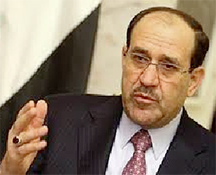BAGHDAD, (Reuters) – Iraqi Prime Minister Nuri al-Maliki refused yesterday to give up his quest for a third term in power, defying a chorus of critics demanding his replacement as the country faces an existential threat from Islamist insurgents.
Maliki has come under mounting pressure since militants of the group now calling itself the Islamic State rampaged through swathes of the country last month and declared a mediaeval-style caliphate on land they have captured in Iraq and neighbouring Syria.
“I will never give up my candidacy for the post of prime minister,” Maliki said in a statement read out on state television by an announcer.
“I will remain a soldier, defending the interests of Iraq and its people,” he added, in the face of what he called terrorists and their allies.
He was referring to the Islamic State and some of the most prominent armed Sunni groups who have taken control of large parts of majority-Sunni regions of Iraq.
Maliki’s statement will complicate the struggle to form a new government to unite the ethnically and religiously divided country, something parliament failed to achieve this week. It extends a political deadlock made all the more dangerous by the pressing threat to Iraq’s territorial integrity.
Accused by his critics of exacerbating the country’s sectarian split, Maliki has come under immense pressure to step down from his Sunni and Kurdish political foes, and even from some in his own Shi’ite camp.
In pointed comments in a Friday sermon read by an aide, the country’s leading Shi’ite cleric said parliament’s inability to form a new government at its first session was a “regrettable failure”.
Grand Ayatollah Ali al-Sistani reiterated his call for the government to have “broad national acceptance”, a formulation that many officials interpret as a call for Maliki – accused by Sunnis of marginalising them and worsening ethnic tensions – to go.
Iraq’s implosion has been watched with intense concern by the United States, which invaded in 2003 to topple dictator Saddam Hussein and withdraw in 2011 after a war that cost almost 4,500 American and tens of thousands of Iraqi lives.
Washington has deployed advisers to Iraq. U.S. military officials believe the Iraqi army will be able to defend Baghdad but struggle to recapture lost territory, mainly because of logistical weaknesses.
VILLAGE CAPTURED

There was some encouragement for the Iraqi army on the battlefield: late on Thursday it scored a symbolic victory by recapturing Awja – the home village of Saddam Hussein – from Sunni insurgents.
Backed by helicopter gunships and helped by Shi’ite Muslim volunteers, the army took the village in an hour-long battle, according to state media, police and local inhabitants.
Awja lies 8 km (5 miles) south of Tikrit, a city that was captured by the Islamic State, an al Qaeda offshoot formerly known as the Islamic State in Iraq and the Levant (ISIL), as part of its lightning assault last month.
Iraqi’s police and army imploded in the face of the militant onslaught, which also captured Mosul and other major Sunni areas. A government offensive to retake Tikrit began on June 28, but the army has still failed to win back the city




